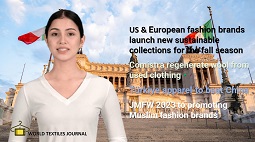In an era where fast fashion dominates the market, Uniqlo stands out for its commitment to sustainability and ethical practices deeply rooted in Japanese values. The renowned Japanese casualwear brand has embraced a philosophy known as "LifeWear," which guides its business practices and sets it apart in the industry.
Seneiya Navajas, the sustainability senior manager at Fast Retailing U.S., discussed Uniqlo's LifeWear doctrine during a panel at the Road to 2030 Sustainability Summit. She emphasized that LifeWear represents Uniqlo's dedication to designing apparel that enhances everyday life, focusing on thoughtfulness, simplicity, and intentionality in every aspect of their operations.
At the heart of Uniqlo's sustainability efforts lies the Re.Uniqlo initiative, established over 20 years ago. Through Re.Uniqlo, the brand promotes circularity by encouraging customers to return their used Uniqlo garments for reuse, recycling, or donation to those in need. Uniqlo partners with organizations like the UN Refugee Agency to distribute these donated items, prioritizing local communities and understanding their specific needs.
Furthermore, Uniqlo's commitment to sustainability extends to its repair and customization services. Re.Uniqlo Studios, located in various cities worldwide, offer repair services for damaged garments at an affordable price. Customers can also customize their Uniqlo pieces using traditional Japanese techniques like Sashiko embroidery, adding a unique touch to their clothing.
Innovative approaches like upcycling unsellable items further demonstrate Uniqlo's dedication to reducing waste and promoting sustainability. By transforming returned garments with minor flaws into new, desirable products, Uniqlo ensures that every item has a useful life and minimizes its environmental impact.
Despite the labor-intensive nature of repair and upcycling processes, Uniqlo believes in their scalability and is expanding its Re.Uniqlo Studios globally. By leveraging existing infrastructure and collaborating with design schools and emerging designers, Uniqlo aims to make sustainable fashion accessible to all consumers.
Navajas emphasized that Uniqlo's commitment to sustainability is deeply rooted in Japanese values such as longevity, thoughtfulness, and responsibility. The concept of "mottainai," which conveys regret over waste, resonates strongly with Uniqlo's philosophy of maximizing the utility of every garment and minimizing environmental impact.
In a fast-paced industry driven by trends and consumer demand, Uniqlo's steadfast dedication to sustainability sets a precedent for ethical fashion practices. By staying true to its Japanese roots and embracing principles of longevity and respect, Uniqlo continues to lead the way towards a more sustainable future for the fashion industry.





